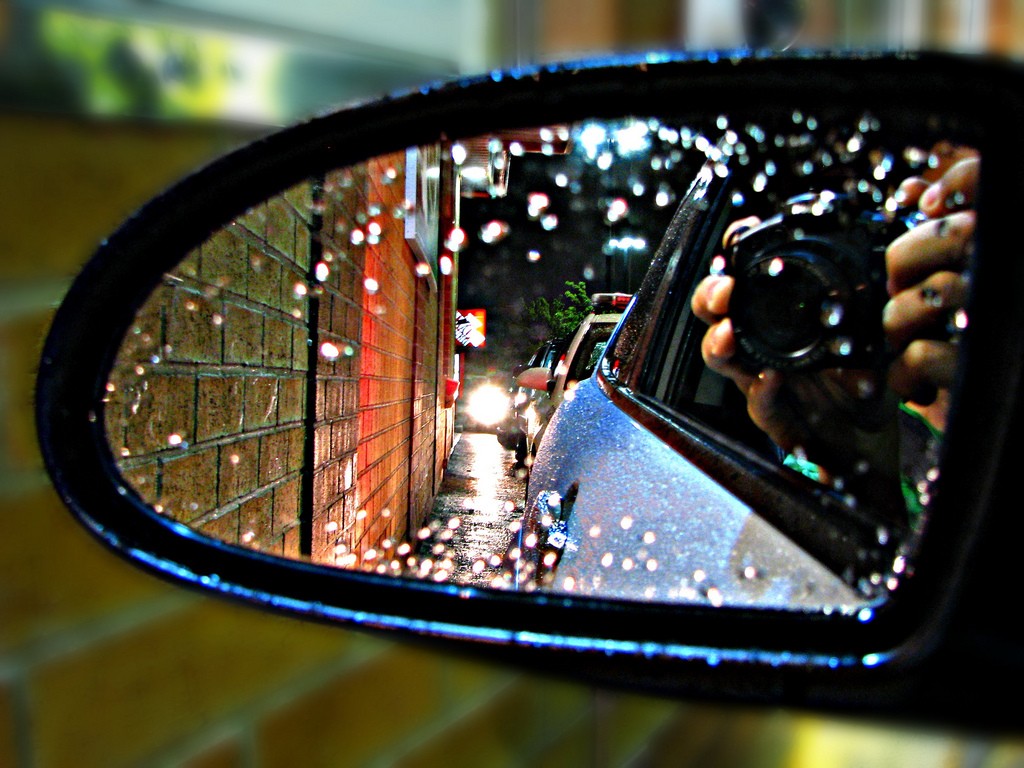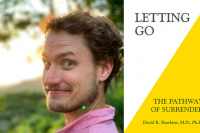A friend of mine — let’s call him Huck — was walking to a tattoo parlor recently with the intention of getting some new ink, or as he might prefer to think of it, inscribing a new linguistic artifact upon the canvas of his skin.
Huck had almost arrived at the tattoo shop when, in an uncharacteristically self-conscious act, he glanced to his side and stared at his reflection in a storefront window.
In that moment, he felt a bit of confusion as to why he’d looked at his reflection. It seemed to him insensible to be concerned with one’s appearance. Suddenly, he was struck by a thought:
the mirror lies.
This sudden moment of clarity resonated deeply with Huck, and he then decided to spontaneously tattoo “the mirror lies.“ upon his back instead of the tattoo he’d previously had in mind.
Appearances ≠ Reality
Huck explained to me that for him, “the mirror lies.” represents the fact that what we see when we view ourselves will never coincide with the way we are viewed by other people.
We may see superman, while someone else sees a slime ball. Conversely, people with eating disorders see themselves as overweight when it’s clear to everyone else that they’re frighteningly skinny.
These are just a couple examples of a mega-important principle that we, as humans, must understand in order to find more satisfaction in our daily lives and to progress as a species. The principle I’m referring to is this: How things appear to be is not how things are.
What I look like is not what I am. I look like a goofy college grad, but I assure you I’m also a particulate collection of trillions upon trillions of atoms, not to mention a rather messy bundle of experiences, ideas, feelings, insights, and sensations. What a dollar bill looks like is hardly what it is. We may see a rectangular piece of something green and flimsy, but it is also a small shred of dead organic matter and an agreed-upon symbolic representation of a certain fiscal value promised to be repaid by the government.
Certainly, this very phenomenon was what once prompted Martin Luther King, Jr. to observe that “Everything that we see is a shadow cast by that which we do not see.”
But Our Culture is Based on Appearance
Despite this fairly easy-to-understand premise of the illusion of correlation between appearance and truth, our culture is based upon encouraging people to care deeply about appearances.
When people care about appearances, they buy things to make them appear more beautiful, wealthy, noble, educated, etc. When people buy things, the economy does well and rich people get richer. When people buy things, businesses succeed.
So many, many business people out there invest massive amounts of money into keeping people obsessed with what they look like. We’re subconsciously coerced into falsely idolizing “the beautiful people”, and then told that we can be like them if we spend X amount of money.
The wealth displayed by other people also becomes a coercive force. We see people’s fancy homes and luxurious cars and envy them. We want what they have, so we chase appearances.
These are merely two examples, but this paradigm of placing appearances upon a pedestal has so fully permeated (woah, hello unintentional alliteration) our society that it can be seen wherever you look, if you know what you’re looking for.
Problematic Consequences
Just as a mirror shows us the most surface-level aspects of ourselves, our regular perceptions tend toward basic, automatic judgments that represent a small sliver of what’s actually going on. Just as Huck observed that “the mirror lies”, so too do our surface-level perceptions.
And when we become overly entrenched in a culture that drastically over-values appearances, our everyday judgments tend to be very presumptuous. We think appearances are revealing some objective measurement of who we are or who they are or what we’re seeing, but this couldn’t be farther from the truth. Let’s go into a bit more detail to consider the nasty implications of this occurrence in our modern “civilizations”.
In extreme cases, like the eating disorder example mentioned earlier, the mind is capable of complete distortions of physical evidence. This is scary stuff, but perhaps even scarier are the much more subtle and common ways in which the mind miscalculates based on appearance.
Consider that the way we perceive ourselves in a mirror and the way we perceive other people result from the same process — a process of projection.
This means that when we view a person, we view them in light of many preconceived ideas and feelings that we project onto their appearance. When viewing ourselves, we might see a reflection of our current mood, our latest insecurities, the attributes we’ve assigned to ourselves, the roles we believe we play, how the current events in our lives fit into our overarching narrative of selfhood, things people have told us that we are, and/or many other items.
When observing someone else, we may see them in light of stereotypes we’ve internalized, insecurities we’ve developed, ideas we have about how a person should be, what we think we know about the person, roles we see ourselves playing in relation to that person, and/or a host of other factors.
The mind does this automatically, especially when it’s been conditioned to make appearance-based judgments, and unless you become much more aware of this process and consciously work to counteract its effects, it happens all the time, unchecked. The result is that we’re constantly making shallow judgments — about ourselves and other people — based on our own inner narratives and prejudices.
So the homeless man on the street automatically becomes a lazy bum, drug addict, and leech on society. The kids in the tye-dye t-shirts are automatically some hippie-dippie socialist fruitcakes. The attractive waitress at the bar is automatically just another sexy arrangement of molecules who should want to get it on with you. The Trayvon Martins of the world are automatically shady, dangerous threats to be eliminated. The graceful leopard or playful dolphin is automatically a dumb and worthless animal to murder for sport or profit.
Do you see? These types of immediate judgments are insidious and occur constantly all around us. And these are merely a few examples that I felt highlighted the problem nicely.
Think of it this way: the “mirror” that lies to us is not limited to rectangular panes of reflective glass. The mirror is everywhere. All we ever see is a reflection — or more accurately, a projection — of our own worldview, presuppositions, anxieties, and neuroses. Everywhere, all the time.
And maybe this wouldn’t be such a glaring problem if we all had open-minded and understanding points of view, but the truth of the matter is that we don’t. Unless we humans make a conscientious effort to broaden our perspective by doing things like reading, creating, seeking education, traveling, and meeting all types of people, our ability to overcome our surface-level assumptions is pathetically limited.
We need to recognize that each of us is one member of a global family of human beings, or better yet, sentient beings, and that not one of us is inherently better than another. We are not separate from one another or the planet. Try to imagine existing without everything else — you can’t. Thich Nhat Hanh illustrates this beautifully in his book, Being Peace, in this passage:
“If you are a poet, you will see clearly that there is a cloud floating in this sheet of paper. Without a cloud there will be no water; without water, the trees cannot grow; and without trees, you cannot make paper. So the cloud is in here. The existence of this page is dependent on the existence of a cloud. Paper and cloud are so close. Let us think of other things, like sunshine. Sunshine is very important because the forest cannot grow without sunshine, and we humans cannot grow without sunshine. So the logger needs sunshine in order to cut the tree, and the tree needs sunshine in order to be a tree. Therefore you can see sunshine in this sheet of paper. And if you look more deeply, with the eyes of a bodhisattva, with the eyes of those who are awake, you see not only the cloud and the sunshine in it, but that everything is here: the wheat that became the bread for the logger to eat, the logger’s father- everything is in this sheet of paper.”
Everything is interconnected and each thing is only able to live because of its intimate relationship with all other things. This is a scientific fact. Thus, we should embrace compassion, not judgment. Openness, not intolerance. Activism, not apathy. Environmental consciousness, not blind consumerism.
If we can become highly aware of the laughable insufficiency of appearance-based perceptions, we can begin to rid ourselves of jealousy, greed, anger, and hatred. Shallow lives drive us to these states of mind, and we can hardly imagine how they deform, burn, and cripple us until we’re able to reach a deeper place of understanding.
What to Do
If we choose to sit idly by, to ignore essays such as this one, to continue living in the land of appearances, we may be able to convince ourselves that we’ve found some semblance of happiness, but this will not be so.
Happiness can never be attached to any ideal of an externally beautiful life or the forms of our material lives. All that is shiny will one day rust, and all that is beautiful will one day be dust.
Appearances divide us and push us against one another. The way for us to create better lives for ourselves and a promising future for our species on this planet is to gradually distance ourselves from a life based upon appearances. A few ideas for how to do that:
1. Do things that provide no reward apart from intrinsic joy.
2. Become aware of your shallow judgments and actively check yourself.
3. Stop living for material rewards and start living for what excites you.
4. Go out of your way to meet a wide array of different people.
5. Do not assume you know anything and ask questions instead.
Above all, realize, as Huck did, that the mirror lies. As J.R.R. Tolkien once wrote, “All that is gold does not glitter.” What you see and what is are two entirely different things. Dig deeper. Ask questions. Keep seeking. The answers are out there, and a better life is waiting for all of us. It’s high time that we claimed it.
P.S. If you liked this, grab free updates.
Photo Credit: Michael Gil
About Jordan Bates
Jordan Bates is a Lover of God, healer, mentor of leaders, writer, and music maker. The best way to keep up with his work is to join nearly 7,000 people who read his Substack newsletter.





Imagine having that kind of freedom- no judgement. Imagine that
Hey Osvaldo,
Sometimes I wonder if it isn’t impossible to entirely transcend judgment. I know it’s somewhat engrained in our psychology to make appearance-based assessments. However, by working against this tendency, I have managed to dramatically reduce my assumptions about people. And it is seriously freeing. Thanks for commenting.
No judgement=freedom of “becoming who you are”.
Ah, Francis, precisely. Contrived or feigned pity is the WORST. I’m certainly not the most compassionate person and am sometimes just a downright asshole. I’ll admit it. Writing is often a place where I actively try to check my own egotism and judgments. It’s an ongoing struggle.
Sincerity is certainly something I value highly, so thank you. Poke fun at me as you see fit. I’m a fool who writes a lot and occasionally says a few worthwhile things (I hope). Cheers.
This is a good piece of writing
Thank you! 🙂
I think that excesses are bad ‘as totalitarianism, judging is not that bad, it’s like discrimination, it might have negative connotations, but all in perspective means is just to separate, to compute as in compare, I believe that while we do not trasspass other people´s rights, or feelings are not hurt, it is to some extent healthy. A line has to be drawn, and allow room for tolerance, but not be way too passive.
Just one note, review time for our post, doesn´t seems congruent
Carlos,
I think that each of us cannot help judging others to an extent—it’s automatic. But I firmly believe that we need to be aware of this process and try to step back from it to avoid unfairly reducing and compartmentalizing people based on shallow characteristics. It’s at that point that judgment and discrimination become very, very dangerous. Not sure what you’re referring to with your “review time for our post, doesn’t seem congruent” sentence. Perhaps you could clarify.
Thanks for commenting. All the best.
I am in graduate school currently working towards my MSW and I must say this article was very well written with professionalism and integrity. It was also a breath of fresh air that a human of the male species wrote this intelligent gem. I found this article by Googling “Humans are obsessed with appearances.” I have pondered this topic so much in my life because I hate the fact that humans are programmed this way. Our judgements and obsession with physical appearance have lead to all kinds of social problems, like bullying, depression and suicide. Since I am a Christian… Read more »
Hi Jordan, just found your site when I googled to see what comes up for my website: “Beyond The Mirror World”… Yes! The (normal) mirror lies! because of its backwardness! Yes, this reversed, negative image only exists in the mind of the one who is looking into this distorted self image. Most humans on this planet are identified with this image as ‘self’, “I am this person in the mirror” but everyone else sees them correctly. Now, after a radical (spiritual) awakening, disidentifying from this (my) negative mirror image through covering up my mirrors, I saw who and what I… Read more »
1) “The mirror is everywhere”. I hadn’t quite thought of it that way. Good.I shall savor that wine around my slightly cynical tongue. Unless we humans make a conscientious effort to broaden our perspective by doing things like reading, creating, seeking education, traveling, and meeting all types of people, our ability to overcome our surface-level assumptions is pathetically limited. – See more at: http://www.refinethemind.com/the-mirror-lies-beyond-world-of-appearances/#sthash.ksmf0bkV.dpuf2) “Compassion”. A subject dear to my heart. Real compassion. Not the mushy, sentimental, feel-good, trendy, sugar sweet “Oh, you-poor-DEAR” type of theatrical yuk. But REAL FEELINGS. Writers are not always very good at that. They put… Read more »